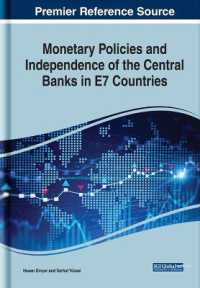- ホーム
- > 洋書
- > 英文書
- > Politics / International Relations
Full Description
The problems and challenges of the Niger Delta predate Nigeria as a Republic. The resultant violence can be traced to 1966, when the late Isaac Boro and his colleagues attempted to secede from Nigeria due, in large part, to the underdevelopment of the region. Historical reality aside, since 1970 oil has displaced agriculture as Nigeria's primary revenue earner and it has, for the last four decades, been the nation's breadbasket. But in spite of this, the Niger Delta remains vastly underdeveloped and has been given the least federal presence.
These deficiencies led to high unemployment, social dislocations, youth restiveness, and extralegalities. It was these realities that bred disaffection with the government and the multinational oil companies and eventually, to violent militancy. Between 2003 and 2009, it also led to low intensity conflict between militant youths and the Nigerian government. In the summer of 2009, however, the Nigerian government extended an offer of presidential pardon (amnesty) to the militants. The amnesty program was intended to bring peace and quiet to the region. However, this has not been the case.
In spite of the financial and political resources that have been expended, the region continues on the path of volatility. This book looks at the issue of nationhood, the cause and cost of the crisis, past approaches and current efforts at solving the crisis. In addition, it offers a tenable solution to the decades-old crisis. Furthermore, the case is made that unless there is a fundamental restructuring of the Nigerian state and its governing structure and institutions, the problems of the region—and the larger problems that makes the country such a difficult to place to live in and govern, is likely to continue.
Contents
List of Maps
List of Tables
List of Abbreviations
Foreword, Olayiwola Abegunrin
Acknowledgements
Introduction
PART ONE: Situating the Republic and the Crisis
Chapter 1: Nigeria: A State, Its People and Institutions
Chapter 2: Situating the Niger Delta Crisis, 2003-2015
Chapter 3: Underdevelopment and the Glaring Reality of the Niger Delta
Chapter 4: The US and EU's Policy toward the Region
PART TWO: The Amnesty and Post-amnesty Environment
Chapter 5: The Human, Financial, and Material Cost of the Conflict
Chapter 6: Challenging the State: Conversation with Henry Okah
Chapter 7: The Presidential Amnesty Program
Chapter 8: The Post-Amnesty Environment
PART THREE: Policy, Policy Statement and the Future
Chapter 9: Sustainable or Fractured Peace
Chapter 10: Nigeria and the Future of the Niger Delta
Chapter 11: Policy Statements: Rethinking the Solutions
Chapter 12: Epilogue: Enters a New (Buhari) Administration
Bibliography
Index
About the Author








